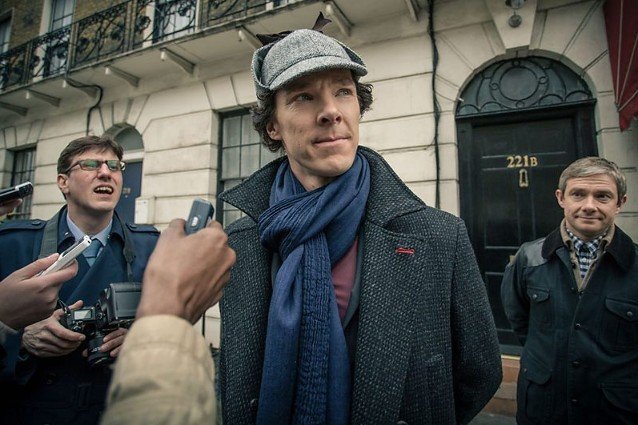 BBC
BBC
The game is finally on as Americans are just now getting their first taste of a third season of Sherlock this week, after the show recently wrapped up its three-episode series across the pond. But according to the program’s showrunner, the eccentric detective might soon start sleuthing on the silver screen.
In a recent interview with Entertainment Weekly, show co-creator Steven Moffat said of the possibility of a Sherlock movie, “We don’t rule anything out.” While this is hardly any sort of confirmation, it does lend to the question of what a true Sherlock film should look like. Since each episode of the series already resembles a feature length film with Sherlock bending his powers of deduction around a central mystery for an hour and a half, an actual big screen romp would need to strongly differentiate itself from Sherlock’s semi-annual outings on TV. So in what ways would Sherlock need to up the ante for a feature film?
The film should introduce Sherlock to new fans
The premiere of the third season of Sherlock saw the show’s plot picking up after a daring cliff hanger, and Sherlock‘s long-awaited return to television is chock-full of meta references and shout-outs for dyed in the wool fans. The show’s increasingly complicated continuity might have new fans scratching their heads, so if a Sherlock film does come to pass, the series would need to take a step back and re-introduce the characters to a new audience of potential fans.
The mystery should be his grandest yet
Sherlock has never been a slouch in the production department, with Moffat and Gatiss filming the series’ version of London with a great cinematic flair, while fun visual overlays really get the audience into the mind of a 21st century Holmes. But a film version should see Moffat and company stretching every extra quid out of the budget to create Sherlock Holmes’ most expansive and epic mystery yet. Something that eclipses the scope of his previous outings, and really gives the detective a sweeping big screen mystery to solve.
And it should be his cleverest too…
One criticism sometimes levied against Sherlock is that series often values style over substance, and as of late, the show has sometimes skimped on the actual crime solving and development of really compelling mysteries in favor of having fun character interactions. In a film version, the central mystery should be a real brain buster. One that has even the most crafty of viewers doing cognitive laps around the details until Sherlock finally comes up with the final answer, and makes everyone watching feel just a little bit slower.
But they shouldn’t turn Sherlock into an action hero
When properties get turned into films, it’s all too easy to trump up the action, and turn the main character into something they’re not. Sherlock’s main weapon has always been his powers of deduction, and while other interpretations of the character (including the Robert Downey Jr./Guy Ritche version) feature a version of Sherlock that’s proficient at hand to hand combat, this Sherlock usually uses his intellect to do the fighting for him. We certainly don’t need to see Sherlock unloading a machine gun into the bad guys while noticing a mustard stain on one of their shirts.
Sherlock needs to hit a new low
Sherlock Holmes is a master of control, and even at his lowest, the great detective never seems anything beyond mildly perturbed by the mystery in front of him. Even his most challenging or personal mysteries don’t seem to rattle Sherlock for all that long. If a Sherlock film does see the light of day, it should see the detective actually struggling with a mystery that’s nearly beyond him. It should be the case that almost breaks him, one that buries him and has him gasping for air. We want to see Sherlock at his absolute lowest and at his most vulnerable, which would make his rise at the film’s climax all the better.
Finally, the film should change the canon
A potential game changer like a Sherlock film should cause have significant changes that can’t be done away with a start of the season reset button. The film should be treated like a valuable addition to the ongoing Sherlock saga and greatly affect the series going forward. Otherwise, we’d rather just continue watching the series on the telly.


